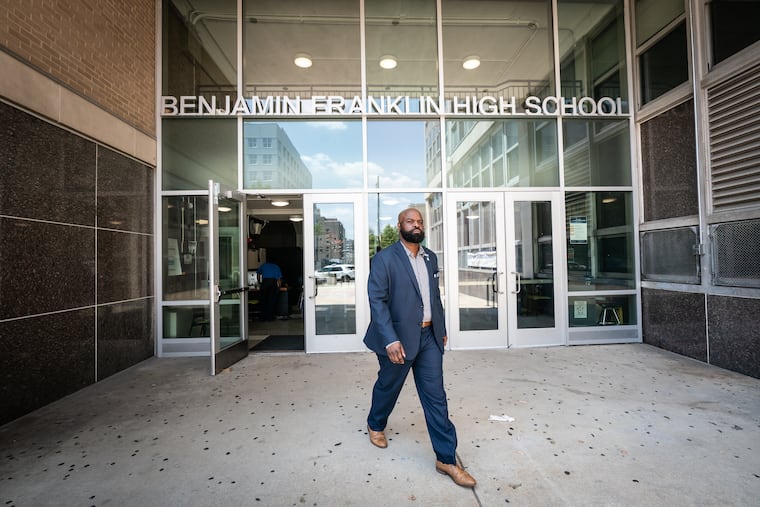Sign of the times: At this Philly day camp, teens learned ‘stop the bleed’ training for gunshot victims
With gun violence rising in Philadelphia, 50 city youths got practical training and stop-the-bleed kits at a one-day camp.

Alyssa Heiser hopes she never has to use the things she learned Friday, but she’ll sleep a little better knowing she’s prepared.
If someone gets shot, the 17-year-old said, she’ll remember the stop-the-bleed steps she picked up at a one-day camp held at Ben Franklin High School on Friday: Call 911, apply pressure with hands, pack the wound and press down, and apply a tourniquet.
“I’m in a neighborhood where robberies, shootings, murders happen all the time,” said Heiser, who lives in Frankford. “Little kids are getting shot, people just out watching fireworks are getting shot. The way things in our city are happening, we all need this.”
Heiser and about 50 other young people participated in a gun-violence prevention and de-escalation day camp sponsored by Phi Beta Sigma Fraternity in conjunction with the Philadelphia Police Department.
The idea sprung from work that Christopher Stith, the fraternity’s regional director of social action, had been doing. During a Phi Beta Sigma town hall meeting on gun violence held earlier this year, most of the talk centered on the way violence affects young people. Stith had developed the “Sigma Self-Defense Series,” lessons in de-escalation and self protection.
What, he thought, if he provided an opportunity for young people to take the class, and to interact with law enforcement in a positive way, to ask questions and have frank conversations? The day camp was born.
The work is crucial, said Chris V. Rey, national president of Phi Beta Sigma.
“A lot of our members have come from these same circumstances, and someone told us that better was over the horizon,” Rey said. “We can change the trajectory of our families’ lives.”
The youths — most of whom had been referred by probation officers — spent several hours learning about how to cool down the temperature of conflicts, and about the mental impact of witnessing or being involved in a traumatic event.
Heiser was eager for practical tips — “information that I can’t get from the crowd I hang around with.” She’d left school in seventh grade, and had been fending for herself, “running the streets” while her mother dealt with addiction. She’s witnessed violence and gotten in trouble herself.
Becoming trained in how to save someone’s life is an important step, said Heiser.
“I want to take a different path in life,” said Heiser, who is in school to earn her GED. She is thinking of learning how to drive a forklift or work in construction.
She turned the stop-the-bleed kit she had been given over in her hands: a tourniquet, surgical gloves, mask, clotting agent and gauze. Carrying it in her purse everywhere wasn’t practical, Heiser said, but she said she committed the steps to memory and knows she could use a piece of a T-shirt and a pen to press it to a wound in an emergency.
“Maybe I can help someone,” she said.
» READ MORE: 300 people have been killed in Philly homicides already this year
Nasir Witherspoon, 17, of West Philadelphia, found the de-escalation lessons especially useful, he said.
Witherspoon sees violence starting over incidental things — neighborhood beefs, misunderstandings.
“In a lot of situations, the small things take people over the top,” said Witherspoon, a rising senior at West Philadelphia High School. “If we’re able to pace ourselves, cool down, take this citywide, it could make a difference.”
That’s the aim. Stith said the day camp will serve as a pilot and the hope is to replicate the program on a larger scale.
Brandon Warfield, member of Phi Beta Sigma and middle school teacher at a Philadelphia charter school, was an instructor at the camp. In the neighborhoods and in his work as a middle school teacher at a West Philadelphia charter school, Warfield sees a lack of practical help to address the gun violence problem.
“We’re trying to bridge the gap,” he said. “I don’t think there’s a lot that’s going on that’s proactive, not reactive. Let’s fix that.”